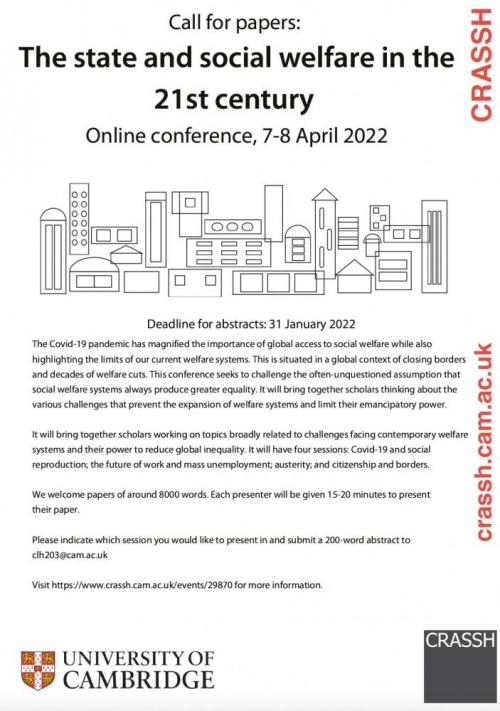
https://www.crassh.cam.ac.uk/events/29870/
https://socialprotection.org/discover/events/state-and-social-welfare-21...
The Covid-19 pandemic has magnified the importance of global access to social welfare while also highlighting the limits of our current welfare systems. This is situated in a global context of closing borders and decades of welfare cuts. This conference seeks to challenge the often-unquestioned assumption that social welfare systems always produce greater equality. It will bring together scholars thinking about the various challenges that prevent the expansion of welfare systems and limit their emancipatory power. The upcoming conference will take place over two afternoons (7-8 April 2022). It will have four thematic sessions:
- Session 1: Covid-19 and social reproduction
- Session 2: The future of work and mass unemployment
- Session 3: Austerity
- Session 4: Citizenship and borders
Speakers:
Franco Barchiesi (Ohio State University)
Manali Desai (University of Cambridge)
Liz Fouksman (Kings College London)
Hangala Siachiwena (University of Cape Town)
Peter Sloman (University of Cambridge)
Karyn Vilbig (New York University)
Convenors
- Courtney Hallink (University of Cambridge)
- Nabila Idris (University of Cambridge)
- Anna Wood (University of Cambridge)
Summary
The Covid-19 pandemic has magnified the importance of global access to social welfare while also highlighting the limits of our current welfare systems. This is situated in a global context of closing borders and decades of welfare cuts. This conference seeks to challenge the often-unquestioned assumption that social welfare systems always produce greater equality. It will bring together scholars thinking about the various challenges that prevent the expansion of welfare systems and limit their emancipatory power.
The upcoming conference will take place over two afternoons (7-8 April 2022). It will have four thematic sessions:
Session 1: Covid-19 and social reproduction
The Covid-19 pandemic has shed light on the contradictions between the interests of capital and the importance of adequate social welfare systems for subsistence and social reproduction, including adequate healthcare provision. This session will bring together individuals working on social welfare in the age of Covid-19.
Session 2: The future of work and mass unemployment
Social assistance for unemployed adults has long been a particularly contentious area of social policy. Individuals with the ability to work are expected to earn their subsistence through wage-labour. However, with rising unemployment and declining wages, the physical ability to work no longer guarantees that individuals will be able to sustain themselves through work alone. This session will bring together scholars thinking about the importance of work to our current social imaginaries and ask how our moral attachment to work impedes our creativity when imagining new welfare systems that are truly emancipatory.
Session 3: Austerity
This session seeks to complicate existing accounts on austerity and asks how charges of affordability are used to justify social spending cuts. The extension of social welfare programmes worldwide after the onset of the Covid-19 pandemic suggests that ‘affordability’ is only part of the story.
Session 4: Citizenship and borders
The Covid-19 pandemic has magnified the role of borders in protecting national welfare systems. This session seeks to provoke conversation on the exclusionary power of citizenship from both a historical and contemporary perspective. It will situate this in the post-colonial context and ask how we can theorise exclusion from social welfare based on citizenship as a form of border imperialism.










Add new comment